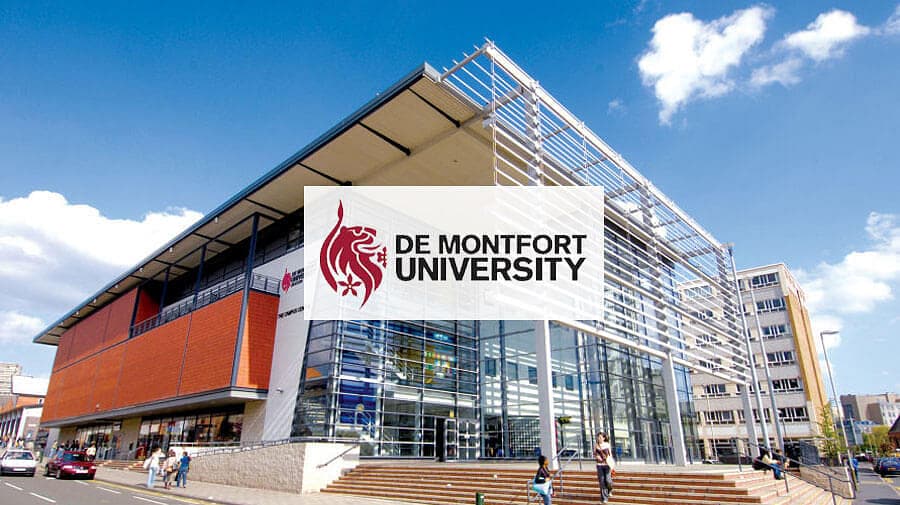

De Montfort University Admissions 2026-27
Leicester, United Kingdom
- Cost of Living£ 15,384
- Tuition Fee From£ 10,700
- Country Rank-
- Batch Strength21,889
- Global Diversity33%
- Gender Ratio44:56
De Montfort University (DMU) welcomes applications from students worldwide, offering a diverse range of undergraduate and postgraduate programmes. De Montfort University acceptance rate stands at approximately 58%, indicating a moderately selective admission process that values strong academic performance and well-prepared applications.
|
Aspect |
Details |
|
Application Portals |
Undergraduate: UCAS Postgraduate: DMU Online Portal |
|
Average GPA Requirement |
Varies by course and country; typically, strong academic performance is required. For Indian boards, a 65% average in the four best subjects is generally required for undergraduate studies, and 50–60% is required for a bachelor's degree for postgraduate studies. |
|
Undergraduate Entry Requirements |
Minimum of 65% average in four best subjects (excluding Hindi) in Standard 12 for Indian students, or equivalent to UK A-levels. Some courses may require a portfolio or interview. |
|
Postgraduate Entry Requirements |
A bachelor's degree from a recognised institution, typically with 50–60% depending on the university and course. Some courses may require relevant work experience. |
|
English Language Requirements |
IELTS: 6.0–7.5 (varies by course). Other accepted tests: TOEFL iBT (80–90), PTE Academic (58–65), Duolingo English Test (100–120). |
|
Acceptance Rate |
Approximately 58%. Some sources indicate around 45%. |
|
Deferred Entry |
Possible for some postgraduate programmes. |
|
Scholarships |
Merit-based and need-based scholarships are available for both home and international students. |
De Montfort University Application Deadlines 2025-26
Early application is strongly recommended to secure a place and allow sufficient time for visa processing.
|
Intake |
Undergraduate Deadline |
Postgraduate Deadline |
|
September Intake |
30 June 2025 (main) |
31 July 2025 (tentative) |
De Montfort University Visa Requirements for International Students
International students require a UK Student Visa (formerly Tier 4) to study at DMU. Key requirements include:
- Confirmation of Acceptance for Studies (CAS): DMU issues this once an offer is accepted and any required deposits are paid.
- Proof of Funds: Evidence of sufficient funds to cover tuition fees and living expenses..
- English Language Proficiency: Demonstrated through approved tests.
- Valid Passport: Your passport must be valid for the duration of your studies.
- Academic Transcripts: Original transcripts from previous institutions.
- Tuberculosis (TB) Test Certificate: Required for applicants from certain countries.
- Credibility Interview: Some international students may need to attend a credibility interview.
Visa applications should be submitted well in advance of the course start date to allow for processing time.
De Montfort University Application Process 2025-26
International students must follow a clear step-by-step process to apply to De Montfort University:
- Choose Your Course:
Explore the range of bachelor's, diploma, and master's programmes on the DMU website. Ensure the chosen course aligns with your academic background and career aspirations.
- Check Eligibility:
Carefully review the academic and English language requirements for your specific programme.
- Undergraduate (Indian applicants): Typically requires a minimum of 65% average in four best subjects (excluding Hindi) in Standard 12.
- Postgraduate (Indian applicants): A bachelor's degree with 50–60% or higher is generally expected, depending on the programme.
- Some competitive courses may require interviews, portfolios, or additional tests.
- Prepare Your Documents:
Gather all necessary supporting documents :
- Academic transcripts and certificates (translated into English if not originally in English).
- A strong personal statement.
- Academic references.
- A valid passport copy.
- Proof of English language proficiency (IELTS, TOEFL, PTE, Duolingo, etc.).
- Submit Your Application:
- Undergraduate: Apply via UCAS.
- Postgraduate: Apply directly through the DMU online portal.
- Applying early is recommended, especially since admissions are competitive and some scholarships are awarded on a rolling basis.
- Pay the Application Fee:
- Undergraduate (via UCAS): EUR 22–28.50 (approximately INR 1.9K–2.5K).
- Postgraduate: No application fee for international students.
- Await Admission Decision:
DMU assesses applications based on academic merit, supporting documents, and specific course criteria. You will receive a conditional or unconditional offer if successful.
- Accept Offer & Apply for Visa:
Once you accept your offer and pay any required deposit, DMU will issue your Confirmation of Acceptance for Studies (CAS), which is essential for your UK Student Visa application.
- Arrange Tuition & Accommodation:
Finalise tuition fee payments and arrange your accommodation. DMU offers a range of on-campus and off-campus housing options